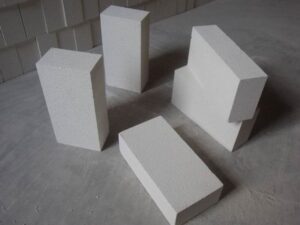Description
Ceramic Fiber Modules: A Powerful Solution for High-Temperature Insulation
In the demanding world of industrial processing, maintaining efficient and reliable insulation at extremely high temperatures is a critical challenge. Traditional insulation materials often fall short, degrading or failing entirely under intense heat. This is where ceramic fiber modules step in, offering a robust and versatile solution for a wide range of applications.
What are Ceramic Fiber Modules?
Ceramic fiber modules are pre-engineered insulation blocks constructed from high-performance ceramic fibers. These fibers, composed primarily of alumina-silica or zirconium oxide, are renowned for their exceptional thermal resistance, low thermal conductivity, and lightweight properties. The modules are typically manufactured by folding, stacking, or edge-stacking the ceramic fiber blankets, then compressing and securing them within a metal framework. This pre-engineered format allows for faster and easier installation compared to traditional loose-fill or blanket insulation methods.
Key Advantages of Ceramic Fiber Modules:
- Superior Thermal Performance: Ceramic fiber modules excel in high-temperature environments, withstanding temperatures up to 1600°C (2900°F) and even higher with specialized formulations. Their low thermal conductivity minimizes heat loss, leading to significant energy savings and improved process efficiency.
- Fast and Easy Installation: The pre-engineered design of ceramic fiber modules simplifies installation, significantly reducing downtime and labor costs. Modules can be easily anchored to furnace walls, roofs, and other structures using various mechanical fastening systems.
- Lightweight and Durable: Compared to traditional refractory materials, ceramic fiber modules are exceptionally lightweight, reducing structural support requirements and easing handling. They also boast excellent resistance to thermal shock, corrosion, and vibration, ensuring long-term performance and reduced maintenance.
- Design Flexibility: Ceramic fiber modules are available in a wide range of sizes, densities, and configurations, allowing for customized insulation solutions tailored to specific application requirements. They can be easily cut and shaped to fit complex geometries and accommodate penetrations, offering unparalleled design flexibility.
- Improved Air Quality: Unlike some traditional insulation materials, ceramic fiber modules are generally low in organic binders, contributing to cleaner air quality within the workspace.
Applications Across Industries:
The unique properties of ceramic fiber modules make them ideal for a diverse range of high-temperature applications, including:
- Furnaces and Kilns: Lining the walls, roofs, and doors of furnaces and kilns used in industries such as metals processing, ceramics manufacturing, and heat treatment.
- Incinerators and Boilers: Providing thermal insulation for incinerators and boilers used in waste management and power generation.
- Petrochemical Processing: Insulating reactors, reformers, and other high-temperature equipment in petrochemical plants.
- Glass Manufacturing: Lining glass melting furnaces and forming equipment to maintain optimal temperatures and reduce energy consumption.
- Aluminum Smelting: Insulating electrolytic cells and other equipment used in aluminum production.
- Aerospace: Providing thermal protection for aircraft engines, exhaust systems, and other high-temperature components.
Choosing the Right Ceramic Fiber Module:
Selecting the appropriate ceramic fiber module for a specific application requires careful consideration of several factors, including:
- Operating Temperature: The maximum operating temperature of the equipment or process.
- Thermal Conductivity: The desired level of insulation performance.
- Physical Properties: The required density, strength, and flexibility.
- Chemical Environment: The presence of corrosive gases or liquids.
- Installation Requirements: The ease of installation and accessibility.
Consulting with a qualified insulation specialist is highly recommended to ensure the selection of the optimal ceramic fiber module for your specific needs.
Conclusion:
Ceramic fiber modules represent a significant advancement in high-temperature insulation technology. Their superior thermal performance, ease of installation, and design flexibility make them a cost-effective and reliable solution for a wide range of industrial applications. By leveraging the benefits of ceramic fiber modules, businesses can improve energy efficiency, reduce operating costs, and enhance the performance and longevity of their high-temperature equipment. As industries increasingly demand efficient and sustainable solutions, ceramic fiber modules are poised to play an increasingly vital role in shaping the future of high-temperature insulation.












Reviews
There are no reviews yet.